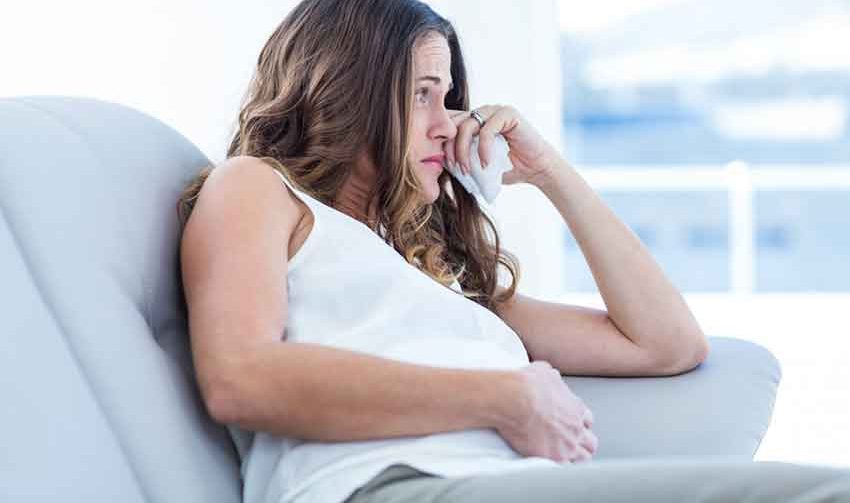Depression During Pregnancy

Expecting a baby brings mixed emotions. Moms-to-be may be excited, happy, and a bit nervous. But it’s not unusual to be depressed during pregnancy, too.
Women feel many emotions during pregnancy. And while it’s a joyful and happy time for many, it’s not unusual for mothers-to-be to also experience some not-so-sunny feelings, including anxiety and sadness, from time to time.
Some emotional ups and downs are normal while you are expecting and usually are nothing to worry about — unless deep feelings of depression during pregnancy are chronic.
Without support and help, a pregnant woman who is seriously depressed may feel overwhelmed and be unable to take optimum care of herself, placing her health and the wellbeing of her unborn child at risk, according to the National Institute of Child and Human Development (NICHD).
That’s why it’s important for pregnant women, their partners, and family and friends to understand potential causes and symptoms of depression during pregnancy — and how to get help for expectant women dealing with this problem.
YOU MIGHT ALSO LIKE: Should You Take Antidepressants During Pregnancy?
What causes depression during pregnancy?
There’s not one specific cause that triggers pregnancy-linked depression, according to the March of Dimes. Instead, it is likely the result of a combination of things, including life events, stress, and hormone changes that can impact parts of the brain involved with mood and emotion.
Chronic depression when a woman is pregnant may have a genetic component, too. In fact, a family history of depression or a personal history of previous bouts of depression is associated with a higher risk of pregnancy-linked depression.
Other recognized risk factors for depression during pregnancy include:
- Having an unplanned or unwanted pregnancy
- Being involved in an unhappy relationship, especially one that involves domestic violence
- Being a single mom-to-be or becoming pregnant as a teenager
- Having an unusual amount of stress in your life, such as being separated from your partner or experiencing the death or illness of a family member or spouse
- Being unemployed or having financial difficulties
- Having diabetes (type 1 or type 2) when you become pregnant or developing gestational diabetes — a type of diabetes that develops only during pregnancy
- Experiencing complications during pregnancy, such as learning you are at risk for miscarrying or that your baby may have birth defects
Recognize symptoms of depression during pregnancy
Whether you are a pregnant woman, or you are a family member or friend of a woman who is expecting, it’s important to understand the signs of serious depression when a woman is pregnant.
Mothers-to-be who are suffering from depression usually experience some specific symptoms for two weeks or longer, the American Pregnancy Association points out, including persistent sadness, difficulty concentrating, and sleeping too much or too little.
Depressed expectant moms may lose interest in activities they usually enjoyed. And they may express recurring thoughts about death, suicide, or hopelessness. Anxiety can accompany depression during pregnancy, too.
Although doctors and nurses caring for pregnant women usually screen for depression, it’s important that an expectant mom speak up about her feelings and avoid trying to hide them.
If you see signs of depression in a family member or friend who is pregnant, urge her to talk with her doctor, the NICHD advises.
We can’t emphasize this enough: Depression during pregnancy can be serious
Depression that goes untreated during pregnancy can result in poor nutrition, alcohol and drug abuse, smoking and, in severe cases, suicidal behavior. The result can be serious risks to both the pregnant woman and her baby, leading to premature birth. Babies born to mothers suffering from depression may have a low birth weight and be less active or more agitated than babies born to moms who are not depressed, the American Pregnancy Association points out.
Although every individual case is different, antidepressants are usually not advised during pregnancy. Depression during pregnancy can be helped by counseling, including cognitive behavioral therapy. Support groups available in person or online where pregnant women can share their feelings may also be ; ask your obstetrician or counselor for recommendations.
Bottom line? Depressed moms-to-be need support
The NICHD advises friends and family members offer tangible support to a pregnant woman who is exhibiting symptoms of depression. Offer to cook a meal or go grocery shopping for her or accompany the expectant mom to her doctor’s appointment.
It’s also important to open the lines of communication. Reach out with specific questions and concerns, such as:
- “I know everyone is focused on the baby, but I want to hear about you.”
- “You don’t seem like yourself. Tell me how you are feeling.”
- “Would you like me to make an appointment so you can talk with someone?”
For additional help and referrals, encourage the expectant mom to contact her doctor. Also, share the Substance Abuse and Mental Health Services Administration’s National Helpline at 1-800-662-HELP (4357) for 24-hour free and confidential mental health information, treatment, and recovery services referral.
Updated:
April 08, 2020
Reviewed By:
Janet O’Dell RN